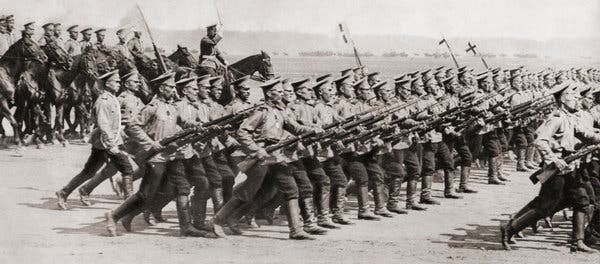Numbers of Soldiers Does Not Win Wars
Hi All,
There has been alot of talk about this war being decided by raw personnel statistics—that the simple fact that Russia can round up and send larger numbers of soldiers to the front line will lead to a Russian victory. I have many people comment that Russia will simply overwhelm Ukraine with numbers of soldiers. Its a rather reductive argument to make, and prioritizes one metric above all others. Its also not one well-supported by history over the previous 120 years. In almost all cases (from the strategic to the tactical) the numerically larger force in a state to state war did not win wars based on the raw numbers of soldiers it has. Indeed the larger force has often lost.
This is because larger numbers of soldiers in and of itself, in industrial and modern warfare, tells you relatively little about the effectiveness of a military force. Its not the numbers of raw soldiers that matters—its having the right number of soldiers for the equipment you have, training them to use the equipment properly, and motivating and supplying them in the field once they are trained. And finally its about providing the right support—such as air power.
This is a question that I addressed directly in How the War was Won: Air-Sea Power and Allied Victory in World War II. The book tries demonstrates that while the Germans had more infantry on the Eastern Front—they had more equipment, technology and trained troops (by a considerable measure) deployed fighting the western Allies. In the conclusion I summarized the importance of land armies versus
This brings us back to the question of victory and defeat in the war. While the overwhelming consensus of historians is that Germany was defeated primarily through the interaction of the large land armies on the Eastern Front, this is only true if one believes that the number of soldiers deployed was the best indicator of national effort. On the other hand, if economic, technological, and overall domestic allocation of resources is a better measurement, the air–sea war between the Germans and the British and Americans was the defining campaign of the war – by a considerable measure. This contest was by far the more modern of the two, involving the most advanced, expensive machinery, in the largest quantities and controlled by the best-trained warriors. It cost the most, destroyed the most, and determined strategy for the last three years of the war.1
In other words, if you looked at what the Germans made and deployed in terms of high value equipment, it wasnt going East against the USSR it was heading west to fight the US and UK (who maintained much smaller, but overall much better trained forces than the USSR).
To discuss this I will talk about World War I, World War II, the Japanese Invasion of China and the Yom Kippur War of 1973.
World War I
Keep reading with a 7-day free trial
Subscribe to Phillips’s Newsletter to keep reading this post and get 7 days of free access to the full post archives.

